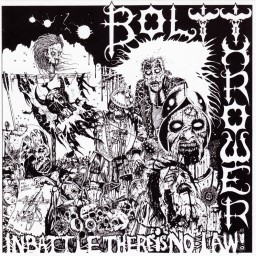 Review by Sonny for Bolt Thrower - In Battle There Is No Law! (1988)
Review by Sonny for Bolt Thrower - In Battle There Is No Law! (1988)
At last us Brits finally get involved in the development of death metal, showing those Yanks that England's Midlands isn't yet a spent force in the world of metal and you don't need Floridian sunshine to play death metal when you've got the rain-drenched, overcast skies of Coventry hanging over you! The Midlands already had an extreme metal scene with Birmingham's legendary grindcore outfit Napalm Death hailing from only a few miles distant from Bolt Thrower's native Coventry. Now Bolt Thrower have always been one of my favourite death metal bands and are one of the few I actually enjoyed at the time, having first encountered them on legenday UK DJ John Peel's evening show performing one of their numerous sessions (probably around the time of the debut's release) so this isn't my first real encounter with In Battle There Is No Law!
The d-beat influences from fellow Midlanders Discharge as well as the grindcore of Napalm Death are plenty evident on Bolt Thrower's debut album. The production is very crust-punk with a lo-fi, echoey and muddy sound that would actually become quite a big part of early death metal (and particularly death doom - see my comments on Sempiternal Deathreign's demo). The black and white pen-drawn cover is another nod to their crust punk roots and influences. They play ridiculously quickly and very loosely, almost verging on sloppily, very much as a result of the Discharge / Napalm Death influence on their early work and their sound is built on a massive bottom end. Their lyrical obsession with war and it's effects are evident even this early on with tracks like the title track, Attack in the Aftermath and Nuclear Annihilation describing the numbing effects of war on the human psyche.
In Battle There Is No Law! is a raw and visceral slab of UK metal history that illustrates the development of a different branch of the death metal tree as a result of influences that are separate from the US experience of early death metal and show that DM did not spring from a singular influence, but is rather a product of different influences from a diverse set of locations. Personally I love this kind of shit, but it IS quite different from the likes of Death and Morbid Angel and sounds much more DIY with a demo-ey feel to it that may not appeal to everyone.
